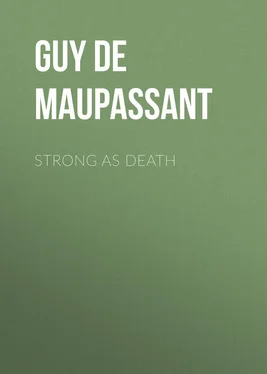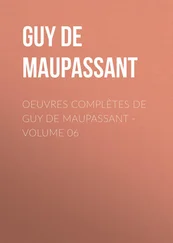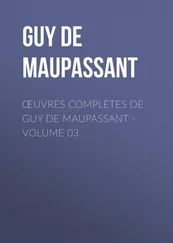Guy Maupassant - Strong as Death
Здесь есть возможность читать онлайн «Guy Maupassant - Strong as Death» — ознакомительный отрывок электронной книги совершенно бесплатно, а после прочтения отрывка купить полную версию. В некоторых случаях можно слушать аудио, скачать через торрент в формате fb2 и присутствует краткое содержание. Жанр: literature_19, foreign_antique, foreign_prose, на английском языке. Описание произведения, (предисловие) а так же отзывы посетителей доступны на портале библиотеки ЛибКат.
- Название:Strong as Death
- Автор:
- Жанр:
- Год:неизвестен
- ISBN:нет данных
- Рейтинг книги:4 / 5. Голосов: 1
-
Избранное:Добавить в избранное
- Отзывы:
-
Ваша оценка:
- 80
- 1
- 2
- 3
- 4
- 5
Strong as Death: краткое содержание, описание и аннотация
Предлагаем к чтению аннотацию, описание, краткое содержание или предисловие (зависит от того, что написал сам автор книги «Strong as Death»). Если вы не нашли необходимую информацию о книге — напишите в комментариях, мы постараемся отыскать её.
Strong as Death — читать онлайн ознакомительный отрывок
Ниже представлен текст книги, разбитый по страницам. Система сохранения места последней прочитанной страницы, позволяет с удобством читать онлайн бесплатно книгу «Strong as Death», без необходимости каждый раз заново искать на чём Вы остановились. Поставьте закладку, и сможете в любой момент перейти на страницу, на которой закончили чтение.
Интервал:
Закладка:
He did not go out that evening, in order to live over again that rapturous moment; he retired early, his heart vibrating with happiness. He had hardly awakened the next morning before he asked himself what he should do. To a cocotte or an actress he would have sent flowers or even a jewel; but he was tortured with perplexity before this new situation.
He wished to express, in delicate and charming terms, the gratitude of his soul, his ecstasy of mad tenderness, his offer of a devotion that should be eternal; but in order to intimate all these passionate and high-souled thoughts he could find only set phrases, commonplace expressions, vulgar and puerile.
Assuredly, he must write – but what? He scribbled, erased, tore up and began anew twenty letters, all of which seemed to him insulting, odious, ridiculous.
He gave up the idea of writing, therefore, and decided to go to see her, as soon as the hour for the sitting had passed, for he felt very sure that she would not come.
Shutting himself up in his studio, he stood in mental exaltation before the portrait, his lips longing to press themselves on the painting, whereon something of herself was fixed; and again and again he looked out of the window into the street. Every gown he saw in the distance made his heart throb quickly. Twenty times he believed that he saw her; then when the approaching woman had passed he sat down again, as if overcome by a deception.
Suddenly he saw her, doubted, then took his opera-glass, recognized her, and, dizzy with violent emotion, sat down once more to await her.
When she entered he threw himself on his knees and tried to take her hands, but she drew them away abruptly, and, as he remained at her feet, filled with anguish, his eyes raised to hers, she said haughtily:
“What are you doing, Monsieur? I do not understand that attitude.”
“Oh, Madame, I entreat you – ”
She interrupted him harshly:
“Rise! You are ridiculous!”
He rose, dazed, and murmured:
“What is the matter? Do not treat me in this way – I love you!”
Then, in a few short, dry phrases, she signified her wishes, and decreed the situation.
“I do not understand what you wish to say. Never speak to me of your love, or I shall leave this studio never to return. If you forget for a single moment this condition of my presence here, you never will see me again.”
He looked at her, crushed by this unexpected harshness; then he understood, and murmured:
“I shall obey, Madame.”
“Very well,” she rejoined; “I expected that of you! Now work, for you are long in finishing that portrait.”
He took up his palette and began to paint, but his hand trembled, his troubled eyes looked without seeing; he felt a desire to weep, so deeply wounded was his heart.
He tried to talk to her; she barely answered him. When he attempted to pay her some little compliment on her color, she cut him short in a tone so brusque that he felt suddenly one of those furies of a lover that change tenderness to hatred. Through soul and body he felt a nervous shock, and in a moment he detested her. Yes, yes, that was, indeed, woman! She, too, was like all the others! Why not? She, too, was false, changeable, and weak, like all of them. She had attracted him, seduced him with girlish ruses, trying to overcome him without intending to give him anything in return, enticing him only to refuse him, employing toward him all the tricks of cowardly coquettes who seem always on the point of yielding so long as the man who cringes like a dog before them dares not carry out his desire.
But the situation was the worse for her, after all; he had taken her, he had overcome her. She might try to wash away that fact and answer him insolently; she could efface nothing, and he – he would forget it! Indeed, it would have been a fine bit of folly to embarrass himself with this sort of mistress, who would eat into his artist life with the capricious teeth of a pretty woman.
He felt a desire to whistle, as he did in the presence of his models, but realized that his nerve was giving way and feared to commit some stupidity. He cut short the sitting under pretense of having an appointment. When they bowed at parting they felt themselves farther apart than the day they first met at the Duchesse de Mortemain’s.
As soon as she had gone, he took his hat and topcoat and went out. A cold sun, in a misty blue sky, threw over the city a pale, depressing, unreal light.
After he had walked a long time, with rapid and irritated step, elbowing the passers-by that he need not deviate from a straight line, his great fury against her began to change into sadness and regret. After he had repeated to himself all the reproaches he had poured upon her, he remembered, as he looked at the women that passed him, how pretty and charming she was. Like many others who do not admit it, he had always been waiting to meet the “impossible she,” to find the rare, unique, poetic and passionate being, the dream of whom hovers over our hearts. Had he not almost found it? Was it not she who might have given him this almost impossible happiness? Why, then, is it true that nothing is realized? Why can one seize nothing of that which he pursues, or can succeed only in grasping a phantom, which renders still more grievous this pursuit of illusions?
He was no longer resentful toward her; it was life itself that made him bitter. Now that he was able to reason, he asked himself what cause for anger he had against her? With what could he reproach her, after all? – with being amiable, kind, and gracious toward him, while she herself might well reproach him for having behaved like a villain!
He returned home full of sadness. He would have liked to ask her pardon, to devote himself to her, to make her forget; and he pondered as to how he might enable her to comprehend that henceforth, until death, he would be obedient to all her wishes.
The next day she arrived, accompanied by her daughter, with a smile so sad, an expression so pathetic, that the painter fancied he could see in those poor blue eyes, that had always been so merry, all the pain, all the remorse, all the desolation of that womanly heart. He was moved to pity, and, in order that she might forget, he showed toward her with delicate reserve the most thoughtful attentions. She acknowledged them with gentleness and kindness, with the weary and languid manner of a woman who suffers.
And he, looking at her, seized again with a mad dream of loving and of being loved, asked himself why she was not more indignant at his conduct, how she could still come to his studio, listen to him and answer him, with that memory between them.
Since she could bear to see him again, however, could endure to hear his voice, having always in her mind the one thought which she could not escape, it must be that this thought had not become intolerable to her. When a woman hates the man who has conquered her thus, she cannot remain in his presence without showing her hatred, but that man never can remain wholly indifferent to her. She must either detest him or pardon him. And when she pardons that transgression, she is not far from love!
While he painted slowly, he arrived at this conclusion by small arguments, precise, clear, and sure; he now felt himself strong, steady, and master of the situation. He had only to be prudent, patient, devoted, and one day or another she would again be his.
He knew how to wait. In order to reassure her and to conquer her once more, he practised ruses in his turn; he assumed a tenderness restrained by apparent remorse, hesitating attentions, and indifferent attitudes. Tranquil in the certainty of approaching happiness, what did it matter whether it arrived a little sooner, a little later? He even experienced a strange, subtle pleasure in delay, in watching her, and saying to himself, “She is afraid!” as he saw her coming always with her child.
Читать дальшеИнтервал:
Закладка:
Похожие книги на «Strong as Death»
Представляем Вашему вниманию похожие книги на «Strong as Death» списком для выбора. Мы отобрали схожую по названию и смыслу литературу в надежде предоставить читателям больше вариантов отыскать новые, интересные, ещё непрочитанные произведения.
Обсуждение, отзывы о книге «Strong as Death» и просто собственные мнения читателей. Оставьте ваши комментарии, напишите, что Вы думаете о произведении, его смысле или главных героях. Укажите что конкретно понравилось, а что нет, и почему Вы так считаете.












